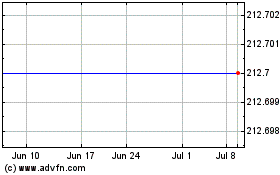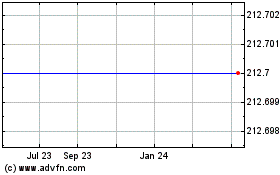Medicaid Insurers Still See Growth Despite State Budget Woes
February 11 2011 - 3:44PM
Dow Jones News
Insurers that run Medicaid programs remain confident they are
entering an unprecedented phase of expansion, despite concerns that
recent budget issues at many states--which are responsible for the
government program--may hamper some of that near-term growth.
The chief executive of Centene Corp. (CNC) this week dismissed
such worries, prompted by recent proposals in several state
capitals to cut Medicaid spending because of budget shortfalls.
Meanwhile, WellPoint Inc.'s (WLP) financial chief this week pointed
to Medicaid as an important growth area for the largest U.S. health
insurer by members.
Industry executives argue the benefits of outsourcing the costly
government program. Medicaid, on average, accounts for some 20% of
state budgets, and health insurers say they can help governments
lower costs through their managed-care plans.
"Difficult economic times make for sound public policy. States
are now more willing to move from fee-for-service to managed care,"
said Michael Neidorff, Centene's chairman and chief executive.
Centene--as well as Medicaid-focused rivals Amerigroup Corp.
(AGP), Molina Healthcare Inc. (MOH) and Wellcare Health Plans Inc.
(WCG)--saw their share prices surge in 2010 on expectations of a
significant rise in Medicaid patients, prompted by last year's
health-care overhaul law and the economic downturn.
"We are very focused on the next couple of years," Neidorff said
during Centene's earnings call this week, citing "unprecedented
demand" and "a full pipeline in 2011 and beyond." More details
should come next week when the other three companies report
quarterly results.
Medicaid will grow by more than 20 million people between now
and 2015, WellPoint Chief Financial Officer Wayne DeVeydt said this
week. "So clearly being in the Medicaid space and being in position
for it is important," he said.
While Medicaid comprises only 5% of WellPoint's membership, the
giant insurer is the second-largest Medicaid writer in the U.S. and
plans to expand the business aggressively, DeVeydt said.
"We are going to go after all the contracts that are coming up.
Now I'm not going to tell you which contracts, but there are many
contracts coming up," he said.
Nonetheless, state budget issues may create headwinds for
Medicaid managed-care companies this year, Goldman Sachs analyst
Matthew Borsch said.
Several states are weighing cuts in Medicaid funding for the
upcoming fiscal year. In Texas, for example, the state House last
month proposed 10% cuts to Medicaid providers.
State budget pressures create a risk for Medicaid managed-care
companies because tighter reimbursements to health plans can lead
to margin pressure, especially if demand for medical services
rebound this year from 2010's unusually weak levels, Borsch
said.
In the week during which Texas made its proposal, shares of
Centene, Amerigroup and Molina each fell at least 7%, a momentary
stumble for stocks that rose 30% or more over the final 10 months
of 2010. Since Jan. 24, the three stocks are each up at least
15%.
The continued share price momentum reflects the long-term belief
that Medicaid growth is inevitable.
Centene's Neidorff noted that recent state budget proposals
calling for tough Medicaid cuts are only preliminary, and he cited
a "major trend" of states moving their highest-cost Medicaid
beneficiaries into managed-care plans.
For example, he said, Illinois--a state facing steep budget
issues--recently mandated that at least half of its 2.8 million
residents eligible for Medicaid be enrolled in a care coordination
program by 2015.
Jefferies & Co. analyst Arthur Henderson agreed with
Neidorff. "While states already outsource just under 50% of their
Medicaid caseloads to managed care, a trend of outsourcing more of
the caseload is growing," the analyst said.
This week, Florida's governor proposed transferring the state's
Medicaid beneficiaries into managed care.
Extra Medicaid funding from the 2009 economic stimulus bill will
end the day before most states' fiscal 2012 starts on July 1,
Standard & Poor's recently said. Meanwhile, the health-care
overhaul requires states to expand Medicaid eligibility as of 2014.
The federal government will pay for newly eligible Medicaid
beneficiaries from 2014 through 2016, gradually decreasing support
over several years.
"The Medicaid sector is heading towards one of the largest
growth phases since the four pure plays went public," Wedbush
Securities analyst Sarah James said. She added that the market was
undervaluing Medicaid expansions and noted the stocks were trading
earlier this week at a 16% discount to 10-year average
price-to-earnings ratios.
-By Dinah Wisenberg Brin, Dow Jones Newswires, 215-656-8285;
dinah.brin@dowjones.com
Aetna (NYSE:AET)
Historical Stock Chart
From May 2024 to Jun 2024

Aetna (NYSE:AET)
Historical Stock Chart
From Jun 2023 to Jun 2024
